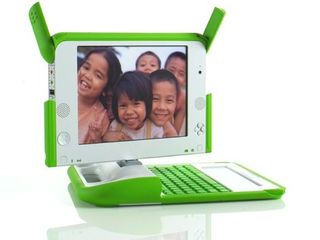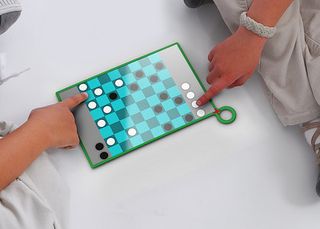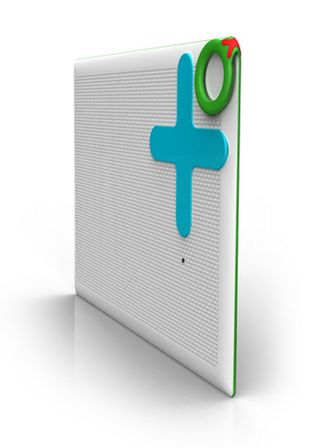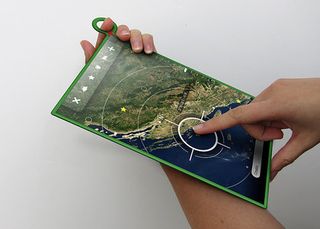Interview: How OLPC plans to give 30 million laptops to Africa by 2015
OLPC CEO Walter De Brouwer explains
TR: You've mentioned the importance of Rwanda to the development of OLPC in Africa. Why is this?
WDB: Well, Rwanda is very important. It has been our first country in Africa and we have a strong commitment to do well there. Our learning centre in Kigali that is ran by [ex MIT Media Lab professor] David Cavallo and his team. It is an enormous deployment, we are looking at two million kids in Rwanda in five years.
TR: So presuming that you can manage to raise the funds and look to produce that number of XO laptops, do you have the manufacturing capacity to deal with that?
WDB: Manufacturing capacity is a luxury. We now manufacture with Quanta in Shanghai. If the funds come in and we tell them that we are going to need a hell of a lot more computers, Quanta is the biggest laptop producer in the world, so they can find a way.

OLPC original the first XO was dogged by manufacturing issues
TR: I suppose the difference is that because OLPC is an education project and not a laptop company – is that a fair point?
WDB: Yes. And of course this is something that we explain every day. But if you look at it from a provisional point of view, then some people that don't know us, when they first look at us they think, "oh, these guys are box movers." But the laptop itself isn't even that important in our vision.
Get daily insight, inspiration and deals in your inbox
Get the hottest deals available in your inbox plus news, reviews, opinion, analysis and more from the TechRadar team.

The OLPC difference "An education initiative, not a laptop company"
TR: Commercial tech and laptop companies such as Intel and Lenovo and Dell all have their own 'Corporate Social Responsibility' initiatives in developing countries. They seem to favour approaches that bring Microsoft Windows-based PCs and other systems that are used in the west to developing countries. Those companies think that is a more productive strategy...
WDB: Well this is post-colonial thinking. OLPC's focus is on primary education, from six to 12 years old. Those children are not going to need to do PowerPoint. Of course, a company thinks of a market for its products – so they are more and more thinking in terms of office-training. But of course you cannot treat kids like that.

OLPC screen tech: Pixel Qi is providing sunlight-friendly displays
You know, these kids are full of wonder. You see the amazement in their eyes when they first touch a laptop. And then going on the internet, where the rest of the world is! Seeing them make music on the net. Making little games, where they learn to program in Logo. Sending mails to each other. Teaching them how to put a video on YouTube… these are all very, very important skills for them. This is the future. This is what they should be learning. Not Excel and PowerPoint. This is a learning project, we are not about preparing them for office work.
And also, if you look at those types of office applications, then you have to think about what we all used three years ago – which was completely different. And what did we all use six years ago? It was entirely different!

Kids at play: Primary schools don't want PowerPoint!
So these kids who are six – when they are 12 they will have six years of computer experience and we just cannot know right now how they will think or what they will do. There is no telling what they will do. But it is not going to be PowerPoint! [laughs]
Nicholas Negroponte [OLPC founder] has always said that "when the mission becomes a market, then we are ready to leave" but we are in countries where right now there is no market, I can assure you. Where we go, I have never seen Intel or Microsoft.
TR: So this latest deal may well be that 'tipping point' that you need in order to start delivering millions more laptops to primary school kids in Africa?
WDB: Yes, every idea has its tipping point. And from then onwards, consensus builds, it gets accepted and people that were previously against it soon forget that they were even against it.
I've seen it happen over the last two years in South America. But of course it is easier there. You have more English-speakers, better electrification and connectivity.

The future of tablets? OLPC's next machine looks impressive
TR: Should you secure the funding and provide thirty million machines to East Africa by 2015 – what do you think the effect will be? What will happen by 2015, should you be successful?
WDB: Well we will be responsible for one of the goals of the United Nation's Millenium Development Goals, to improve education and end poverty by 2015.
Apart from that it will level the playing field, because it cannot be the case that India and China (which all have their problems) are continuing to move up, where African is still continuing to move downwards. Something radical has to happen.
This could be the way to leapfrog that, which is of course the dream of every idealist. But I see these kids, when they first use our laptops in Africa. At first they are clumsy with them, there is no hand-to-eye co-ordination. Then when you come back a couple of months later, they are as good as we are! They are navigating through the software
TR: There is a lot of interest right now in OLPC's plans for its XO-3.0 tablet PC concept machine, following the recent launch of Apple's iPad in the US.
WDB: Yes, we are right now at the XO-1.5 which is our latest machine and is a lot faster and which uses a VIA processor and you can have 4GB or 8GB internally. Our next one, the XO-1.75 will use an ARM processor, which will change the power consumption dramatically. And soon we will be able to have the dream, which is to have the complete computer on a chip. Which will finally get the cost of the machines down to a $100 or less and use far less power.
My expectation for the XO-3.0 tablet is that we will change everything.

Changing everything Will OLPC finally get the cash it needs?
TR: So it will have an iPad-style Pixel Qi touchscreen, that lets you flick between an e-ink display and a traditional backlit LCD type display?
WDB: Well, this is something that Nicholas is working on right now in secret. One thing I can say is that ruggedness will have to be built in, which will be a key feature of the XO 3.0 tablet.
See more on OLPCs XO-3.0 concept over at laptop.org/en/laptop/hardware/xo3.shtml.
- 1
- 2
Current page: Corporate 'CSR' versus OLPC's developmental philosophy
Prev Page How is OLPC going to change Africa?
